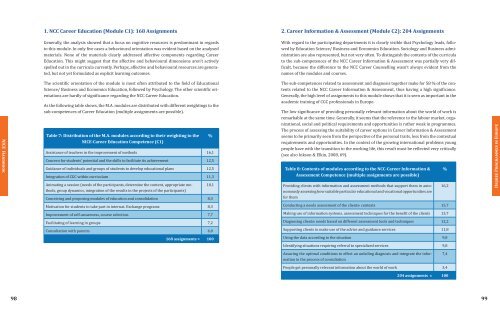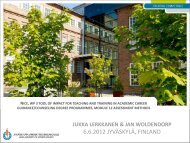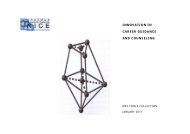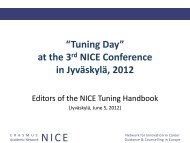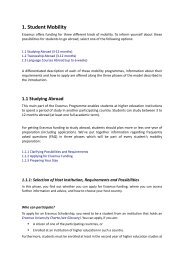NICE HANDBOOK â Academic training of Career ... - Nice-network.eu
NICE HANDBOOK â Academic training of Career ... - Nice-network.eu
NICE HANDBOOK â Academic training of Career ... - Nice-network.eu
Create successful ePaper yourself
Turn your PDF publications into a flip-book with our unique Google optimized e-Paper software.
1. NCC <strong>Career</strong> Education (Module C1): 168 Assignments2. <strong>Career</strong> Information & Assessment (Module C2): 204 AssignmentsGenerally, the analysis showed that a focus on cognitive resources is predominant in regardsto this module. In only five cases a behavioural orientation was evident based on the analysedmaterials. None <strong>of</strong> the materials clearly addressed affective components regarding <strong>Career</strong>Education. This might suggest that the affective and behavioural dimensions aren’t activelyspelled out in the curricula currently. Perhaps, affective and behavioural resources are generated,but not yet formulated as explicit learning outcomes.With regard to the participating departments it is clearly visible that Psychology leads, followedby Education Science/ Business and Economics Education. Sociology and Business administrationare also represented, but not very <strong>of</strong>ten. To distinguish the contents <strong>of</strong> the curriculato the sub-competences <strong>of</strong> the NCC <strong>Career</strong> Information & Assessment was partially very difficult,because the difference to the NCC <strong>Career</strong> Counselling wasn’t always evident from thenames <strong>of</strong> the modules and courses.<strong>NICE</strong> HandbookThe scientific orientation <strong>of</strong> the module is most <strong>of</strong>ten attributed to the field <strong>of</strong> EducationalScience/ Business and Economics Education, followed by Psychology. The other scientific orientationsare hardly <strong>of</strong> significance regarding the NCC <strong>Career</strong> Education.As the following table shows, the M.A. modules are distributed with different weightings to thesub-competences <strong>of</strong> <strong>Career</strong> Education (multiple assignments are possible).Table 7: Distribution <strong>of</strong> the M.A. modules according to their weighting to the<strong>NICE</strong>-<strong>Career</strong> Education Competence (C1)Assistance <strong>of</strong> teachers in the improvement <strong>of</strong> methods 16,1Concern for students’ potential and the skills to facilitate its achievement 12,5Guidance <strong>of</strong> individuals and groups <strong>of</strong> students to develop educational plans 12,5Integration <strong>of</strong> CGC within curriculum 11,3Animating a session (needs <strong>of</strong> the participants, determine the content, appropriate methods,group dynamics, integration <strong>of</strong> the results in the projects <strong>of</strong> the participants)Conceiving and proposing modules <strong>of</strong> education and consolidation 8,3%10,1The sub-competences related to assessment and diagnosis together make for 58 % <strong>of</strong> the contentsrelated to the NCC <strong>Career</strong> Information & Assessment, thus having a high significance.Generally, the high level <strong>of</strong> assignments to this module shows that it is seen as important in theacademic <strong>training</strong> <strong>of</strong> CGC pr<strong>of</strong>essionals in Europe.The low significance <strong>of</strong> providing personally relevant information about the world <strong>of</strong> work isremarkable at the same time. Generally, it seems that the reference to the labour market, organizational,social and political requirements and opportunities is rather weak in programmes.The process <strong>of</strong> assessing the suitability <strong>of</strong> career options in <strong>Career</strong> Information & Assessmentseems to be primarily seen from the perspective <strong>of</strong> the personal traits, less from the contextualrequirements and opportunities. In the context <strong>of</strong> the growing international problems youngpeople have with the transition to the working life, this result must be reflected very critically(see also Inkson & Elkin, 2008, 69).Table 8: Contents <strong>of</strong> modules according to the NCC-<strong>Career</strong> Information &Assessment Competence (multiple assignments are possible)Providing clients with information and assessment methods that support them in autonomouslyassessing how suitable particular educational and vocational opportunities arefor them%16,2Degree Programmes in EuropeMotivation for students to take part in internat. Exchange programs 8,3Conducting a needs assessment <strong>of</strong> the clients› contexts 15,7Improvement <strong>of</strong> self-awareness, course selection. 7,7Making use <strong>of</strong> information systems, assessment techniques for the benefit <strong>of</strong> the clients 13,7Facilitating <strong>of</strong> learning in groups 7,2Diagnosing clients› needs based on different assessment tools and techniques 12,2Consultation with parents 6,0Supporting clients to make use <strong>of</strong> the advice and guidance services 11,8168 assignments = 100Using the data according to the situation 9,8Identifying situations requiring referral to specialized services 9,8Assuring the optimal conditions to effect an unfailing diagnosis and integrate the informationin the process <strong>of</strong> consultation7,4People get personally relevant information about the world <strong>of</strong> work 3,4204 assignments = 10098 99


